6th Ward: Bird tests positive for West Nile virus
Evonda Thomas, Evanston Public Health Director, announced today the first bird testing positive for West Nile virus in Evanston this year.
“As temperatures start to warm up, we’re going to start seeing more mosquito activity and an increased risk for West Nile virus,” said Ms. Thomas. “Although most cases of West Nile virus are mild, the virus can still cause serious, life-altering and even fatal disease. That is why it is so important to protect yourself against mosquito bites by wearing insect repellent and getting rid of any standing water around your home.”
Only about two people in 10 who are bitten by an infected mosquito will experience any illness. Illness from West Nile is usually mild and includes fever, headache and body aches, but serious illness, such as encephalitis, meningitis, and even death are possible. Persons older than 50 years of age have the highest risk of severe disease.
People who observe a sick or dying crow, blue jay, robin or other perching bird should contact their local health department, which will determine if the bird will be picked up for testing.
The best way to prevent West Nile disease or any other mosquito-borne illness is to reduce the number of mosquitoes around your home and to take personal precautions to avoid mosquito bites.
Precautions include:
- Avoid being outdoors when mosquitoes are most active, especially between dusk and dawn.
- When outdoors, wear shoes and socks, long pants and a long-sleeved shirt, and apply insect repellent that includes DEET, picaridin, oil of lemon eucalyptus or IR 3535 according to label instructions. Consult a physician before using repellents on infants.
- Make sure doors and windows have tight-fitting screens. Repair or replace screens that have tears or other openings. Try to keep doors and windows shut, especially at night.
- Eliminate all sources of standing water that can support mosquito breeding, including water in bird baths, ponds, flowerpots, wading pools, old tires and any other receptacles.
Additional information about West Nile virus can be found on the City of Evanston’s webpage www.cityofevanston.org or by calling 847.859.7831 for more information.
- MarkTendam's blog
- Log in to post comments
